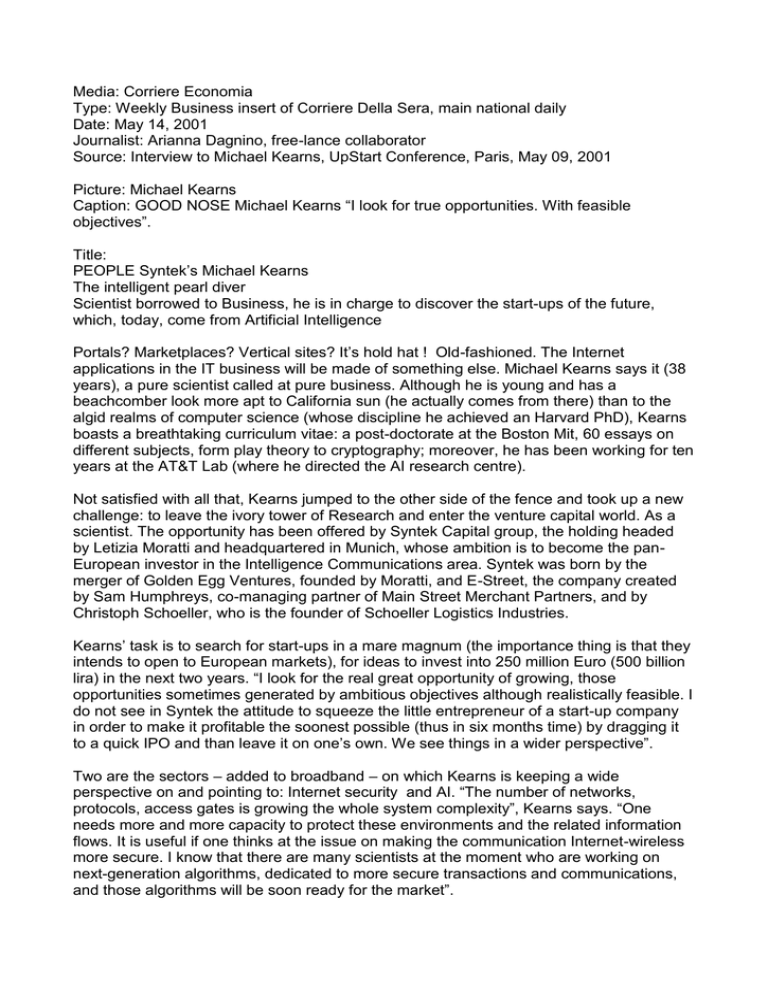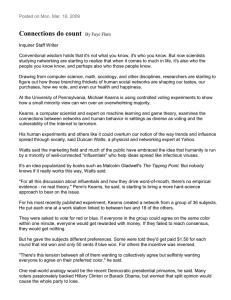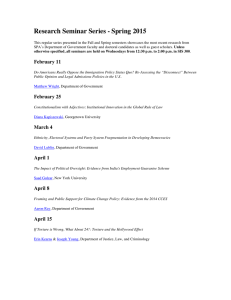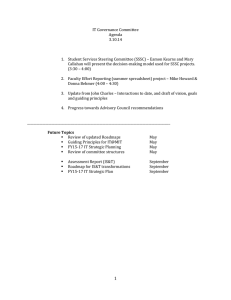Media: Corriere Economia Date: May 14, 2001
advertisement

Media: Corriere Economia Type: Weekly Business insert of Corriere Della Sera, main national daily Date: May 14, 2001 Journalist: Arianna Dagnino, free-lance collaborator Source: Interview to Michael Kearns, UpStart Conference, Paris, May 09, 2001 Picture: Michael Kearns Caption: GOOD NOSE Michael Kearns “I look for true opportunities. With feasible objectives”. Title: PEOPLE Syntek’s Michael Kearns The intelligent pearl diver Scientist borrowed to Business, he is in charge to discover the start-ups of the future, which, today, come from Artificial Intelligence Portals? Marketplaces? Vertical sites? It’s hold hat ! Old-fashioned. The Internet applications in the IT business will be made of something else. Michael Kearns says it (38 years), a pure scientist called at pure business. Although he is young and has a beachcomber look more apt to California sun (he actually comes from there) than to the algid realms of computer science (whose discipline he achieved an Harvard PhD), Kearns boasts a breathtaking curriculum vitae: a post-doctorate at the Boston Mit, 60 essays on different subjects, form play theory to cryptography; moreover, he has been working for ten years at the AT&T Lab (where he directed the AI research centre). Not satisfied with all that, Kearns jumped to the other side of the fence and took up a new challenge: to leave the ivory tower of Research and enter the venture capital world. As a scientist. The opportunity has been offered by Syntek Capital group, the holding headed by Letizia Moratti and headquartered in Munich, whose ambition is to become the panEuropean investor in the Intelligence Communications area. Syntek was born by the merger of Golden Egg Ventures, founded by Moratti, and E-Street, the company created by Sam Humphreys, co-managing partner of Main Street Merchant Partners, and by Christoph Schoeller, who is the founder of Schoeller Logistics Industries. Kearns’ task is to search for start-ups in a mare magnum (the importance thing is that they intends to open to European markets), for ideas to invest into 250 million Euro (500 billion lira) in the next two years. “I look for the real great opportunity of growing, those opportunities sometimes generated by ambitious objectives although realistically feasible. I do not see in Syntek the attitude to squeeze the little entrepreneur of a start-up company in order to make it profitable the soonest possible (thus in six months time) by dragging it to a quick IPO and than leave it on one’s own. We see things in a wider perspective”. Two are the sectors – added to broadband – on which Kearns is keeping a wide perspective on and pointing to: Internet security and AI. “The number of networks, protocols, access gates is growing the whole system complexity”, Kearns says. “One needs more and more capacity to protect these environments and the related information flows. It is useful if one thinks at the issue on making the communication Internet-wireless more secure. I know that there are many scientists at the moment who are working on next-generation algorithms, dedicated to more secure transactions and communications, and those algorithms will be soon ready for the market”. But Kearns cares especially about AI when he talks about “great opportunities of growth” and therefore to “great return on investment”. Although he means that on a longer-term perspective. This is quite a typical habit for a scientist, not so typical of a venture capitalist. “I do not ask Syntek to share my vision on great goals, on the greatest objectives of science, those objectives deriving from the attempt to create systems widely reproducing expressions of human intelligence. Nevertheless, there are some specific applications in some sector of the AI which can result very interesting form the market perspective”. For example, those related to voice recognition and data mining (the intelligent organisation and reference work of databases) “Voice recognition systems which are today already available in the market are able to register the voice of a human being and to translate it with accuracy into a textual format, but this is nothing if compared with what we will see in few years: I am talking about systems able to understand the meaning of our words and consequently react (which is very different from the mere reply function in a limited range of words, which is what performed today by some automatic telephone operator). To achieve this functions, we need the so-called dialogue managers – script allowing a true interaction between the man and the machine based on more articulated information flows. “An example of a pioneer in this field”, Kearns reveals, “is a small but well-equipped company from Milan, Abla, in which Syntek is investing”. Another sector in which Kearns foresees interesting developments of the AI is data mining: “Imagine how useful could sound a system which is capable of synthesising long documents in few paragraphs, capturing its true meaning in a second. An application which is already on the market is Whizbang, by a company in Utah which has disseminated its intelligent agents in the Internet in order to collect all job offers, each one written with a different modality, and to translate them in an homogeneous format so that they can be inserted in one database, more structured and of much easy consultation”. The real boom of AI applications according to Kearns will arrive when the sector will not be exclusively the territory of scientists but will open to a larger audience. And time is near: “The US-company Tell me, specialised in voice recognition, has already open a online lab to allow whoever to invent a dialogue manager by using the Xml language. Tell me is committed to run the inventor’s programme on their system so that it is available to whoever requests it. At this point, whoever witty youngster could invent a killer application”. A wit that could value million dollars.


